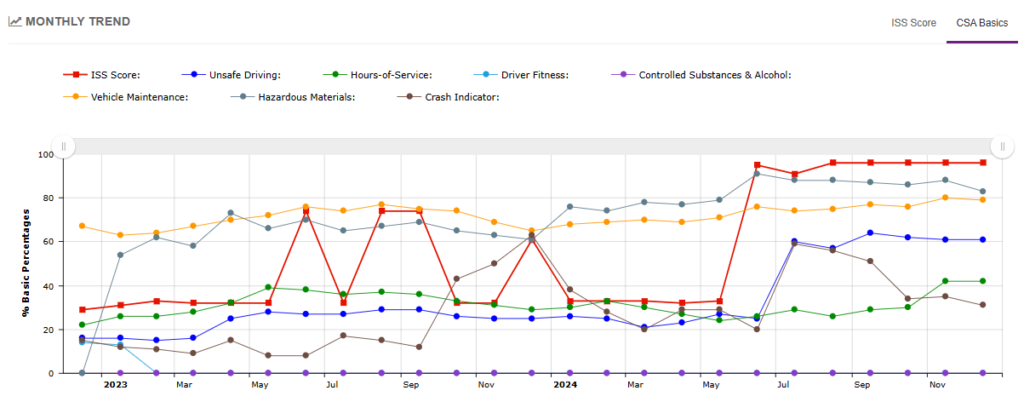Why Your ISS Score Matters
For fleet operators, every minute on the road counts. Unnecessary stops at weigh stations mean wasted time, higher fuel costs, and potential delays—all of which can hurt your bottom line. But did you know your ability to bypass inspections is directly tied to your Inspection Selection System (ISS) score?
Your ISS score is a critical factor in determining whether your trucks get pulled in for inspections or allowed to bypass weigh stations. It’s closely linked to the Compliance, Safety, and Accountability (CSA) program, which tracks safety-related violations through BASICs (Behavior Analysis and Safety Improvement Categories). If your score is too high, expect more inspections. If it’s low, you’ll have a better chance of bypassing weigh stations and keeping your fleet moving efficiently.
Adding to the challenge, each state applies different ISS thresholds. So, even if your fleet performs well in one region, violations in another could still affect your ability to bypass inspections. That’s why maintaining consistent safety practices across your entire fleet is essential to ensuring smooth operations and avoiding unnecessary stops.
So how exactly do ISS scores work, and what can you do to improve yours? Let’s break it down.
What Is an ISS Score?
The ISS score is the Federal Motor Carrier Safety Administration’s (FMCSA) system for prioritizing motor carriers for inspections at weigh stations and enforcement sites. Think of it as your fleet’s safety reputation score.
• Higher ISS score = More likely your trucks will be pulled in for inspections.
• Lower ISS score = More weigh station bypass opportunities with solutions like PrePass.

What Affects Your ISS Score?
Several factors determine your ISS score, and they all play a role in whether your fleet gets inspected.
Here are the key contributors:
- Unsafe Driving Violations – Speeding, reckless driving, failing to obey traffic signs, and other moving violations.
- HOS Compliance – Hours-of-service violations, including driver fatigue and logbook errors.
- Crash History – Preventable accidents and safety incidents can weigh heavily on your score.
Because ISS thresholds vary by state, even a fleet with a strong safety record in one area can face frequent inspections in another. This makes consistent safety performance essential across all operations.
How a Lower ISS Score Benefits Your Fleet
A lower ISS score isn’t just about fewer inspections—it’s a direct path to improved efficiency and profitability. In fact, a 10-point reduction in ISS score may lead to more bypasses, saving your fleet hundreds of hours each year.
- More Bypasses, Fewer Delays – Less time spent at weigh stations means more time on the road.
- Lower Fuel & Maintenance Costs – Fewer stops reduce idling, save fuel, and minimize brake and tire wear.
- Increased Productivity – Drivers stay on schedule, ensuring better delivery timelines and happier customers.
- Competitive Advantage – Shippers and brokers prefer to work with carriers that have strong safety records, leading to better business opportunities.

Source: ATRI Operational Cost of Trucking June 2024 survey and PrePass internal data
How PrePass Helps You Improve ISS Scores
As North America’s most trusted provider of integrated bypass and toll management services, PrePass helps fleets improve safety, reduce costs, and maximize bypass opportunities. A lower ISS score means fewer inspections, fewer delays, and greater efficiency—and we provide the tools, insights, and technology to help you get there.
- Data-Driven Safety Insights – With INFORM™ Safety (pictured below), fleets can track safety trends, identify problem areas, and take proactive steps to improve.
- Review Inspection Results – After an inspection, you can review the critical information from the inspection, which can help you to determine what to spend time on with your team.
- Smart Bypassing Technology – Using a transponder and the PrePass mobile app, fleets with strong safety scores can maximize bypass opportunities.

Steps to Improve Your ISS Score and Unlock More Bypass Opportunities
Check Your ISS Score
- Sign in to the FMCSA Portal to review your ISS score.
- Identify areas for improvement.
Enhance Safety & Compliance
- Work to reduce HOS violations with improved scheduling and fatigue management.
- Provide ongoing driver training to minimize unsafe driving infractions.
- Regularly review inspection reports and challenge any errors.
Leverage PrePass for Maximum Bypass Opportunities
- Use both the transponder & PrePass mobile app to maximize your bypass coverage.
- Access safety alerts to keep drivers informed of road conditions and weather-related issues.
Final Thoughts: Keep Your Fleet Moving with PrePass
At the end of the day, your ISS score can make or break your fleet’s efficiency. A lower score means fewer inspections, reduced costs, and more time spent doing what matters—keeping your trucks on the road.
The good news? You don’t have to manage it alone. By tracking your ISS score, improving safety practices, and leveraging PrePass, you can unlock more bypass opportunities and ensure your fleet keeps moving.
Ready to streamline your operations with a stronger ISS score? Contact PrePass or start a new enrollment today and let’s build a smarter, safer road together.
